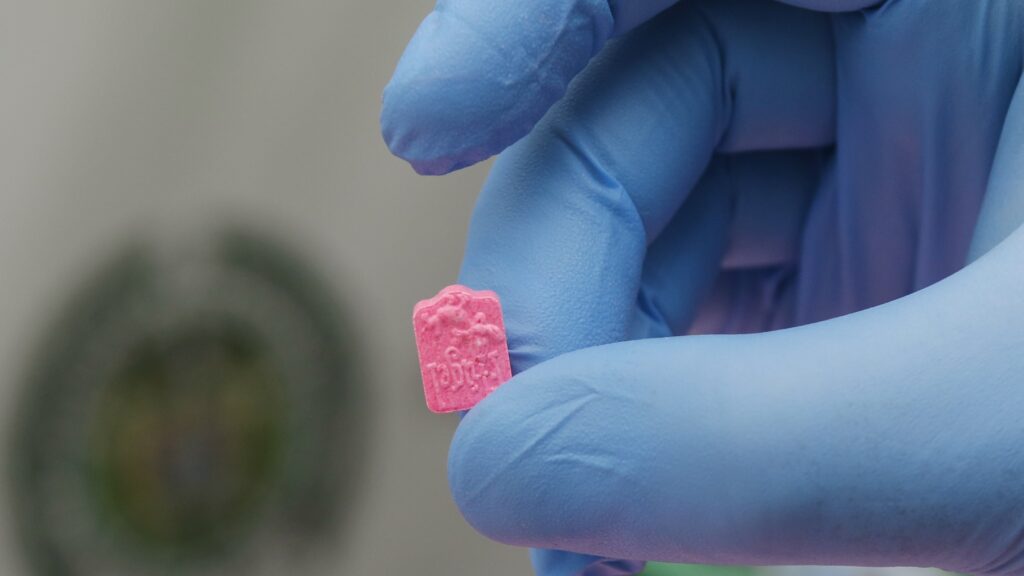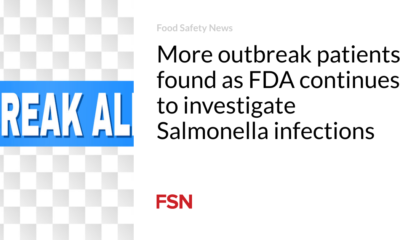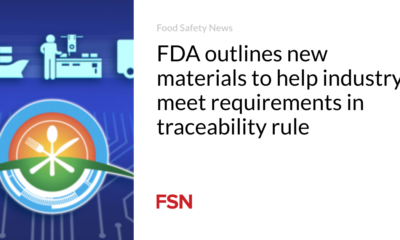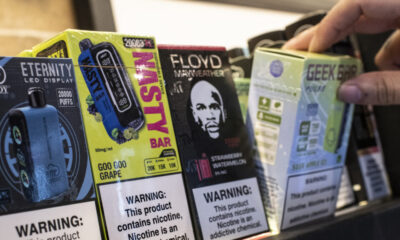Health
MDMA therapy for PTSD faces crucial FDA panel meeting

In less than three months, the Food and Drug Administration will decide whether to approve MDMA as the first new treatment for post-traumatic stress disorder in more than two decades.
It’s a landmark moment for advocates of using psychedelics as treatments for psychiatric disorders: If approved, MDMA would be the first Schedule I psychedelic — classified by the government as having high potential for abuse and no medical benefit — to be found to actually have a medical use. More psychedelics are in the pipeline, with Phase 3 trials underway on psilocybin for treatment-resistant depression, and smaller studies on psychedelics including DMT, ibogaine, and LSD as treatments for a range of conditions, including anorexia, addiction, and autism.
To help make its decision, the FDA will convene a panel of independent scientific advisers on Tuesday to review the evidence for the effectiveness and safety of MDMA-assisted psychotherapy for people with PTSD and make a recommendation either way. The FDA often follows the recommendations of its advisory panels, but not always.
Lykos Therapeutics (previously known as MAPS PBC) conducted two Phase 3 clinical trials testing treatment with MDMA combined with therapy sessions. Those trials were generally favorable, with the first study finding that 67% of participants who had MDMA no longer met diagnostic criteria for PTSD, compared to 32% in the placebo group, and the second study showing 71% of those in the MDMA group no longer met those criteria, compared to 48% who got placebo. But there are plenty of questions for the Psychopharmacologic Drugs Advisory Committee to consider about the trials’ results, as well as how they were conducted.
The FDA, in documents posted on its website Friday, instructed the ad comm to consider the effectiveness of MDMA, whether there’s sufficient safety data, and the merits of a potential Risk Evaluation and Mitigation Strategy (REMS) program to ensure safe administration of MDMA, and ultimately, to vote on whether the treatment’s benefits outweigh its risks. Here’s what to look out for:
Blinding and expectancy bias
The gold standard is for clinical research to be double-blinded — meaning patients don’t know whether they’ve been given the drug or a placebo, and neither do the researchers. Technically, the MDMA research meets those standards. Practically, not so much; it’s hard to mask the mind-altering effects of psychedelics.
In questions the FDA put to the ad comm ahead of the meeting, the agency flagged this as a major issue, writing: “The interpretation of the data from these studies is challenging due to likely impacts of functional blinding and expectation bias.”
In the first Phase 3 trial, 95.7% of those who received MDMA correctly guessed their arm, as did 84.1% of those who received placebo; for the second Phase 3 trial, 94.2% correctly thought they’d had MDMA, and 75% of those in the placebo arm accurately guessed.
Psychiatry studies often struggle with functional blinding but, even compared to SSRI antidepressants (where one meta-analysis of nine studies found 45% to 71% of participants correctly guessed their treatment arm), these results suggest blinding is almost nonexistent. “It could potentially be argued that the functional unblinding effectively renders the trials open-label,” Joar Øveraas Halvorsen, a psychology professor at Norwegian University of Science and Technology, wrote in a public comment sent to the advisory committee.
Although this sounds like a major wrinkle, Lykos Therapeutics worked with the FDA to figure out trial design through the agency’s special protocol assessment process. And so the Phase 3 studies’ design of comparing MDMA plus therapy to placebo plus therapy already received regulatory go-ahead. “Getting bent out of shape about that at this point is a little late,” said Boris Heifets, a neuroscience researcher at Stanford University who studies psychedelics and was not part of the MDMA research.
The process of working with the FDA significantly shaped the trials, said Jennifer Mitchell, a neurology professor at the University of California, San Francisco who led the studies: The FDA has been “remarkably thoughtful in terms of trial design and open communication about what they’d need to see.”
In comments to STAT, Lykos also noted the studies used various measures to mitigate bias, including using independent blinded raters to collect data, measuring results using a clinician-administered PTSD scale rather than patient-reported responses, employing an independent data monitoring committee to oversee the trial, and ensuring therapists didn’t have access to the data collected.
The FDA, in the documents prepared for the ad comm meeting, noted the agency agreed to the study design while “understanding that this study design may be susceptible to functional unblinding.”
Still, the blinding issue hasn’t gone away, not least because it was flagged in a report from the Institute for Clinical and Economic Review (ICER), a nonprofit that evaluates the cost-effectiveness of drugs. Even given the difficulties of blinding psychedelics, David Rind, chief medical officer at ICER, told STAT there was more Lykos could have done. Some 40% of trial participants had previous experience with MDMA, which made it that much more likely they could tell whether they were receiving the drug or not, he said.
Lykos emphasized the majority of participants didn’t have prior MDMA experience. And spokesperson Blair Clark-Schoeb wrote in an email to STAT: “We found that prior use of MDMA did not have an effect on the efficacy results.”
The question of blinding goes hand in hand with expectancy bias, as patients who know they’re receiving MDMA and are excited about the treatment, and their therapists, could both interpret the results more positively. The disproportionate number of people who had prior experience with MDMA suggests they are predisposed to the drug, in that they’d tried the drug before and were willing to sign up for the trial, said Steve Hyman, director of the Stanley Center for Psychiatric Research at the Broad Institute: “That’s not neutral.”
The American Psychiatric Association raised a similar concern in its own public letter to the ad comm: “In many pharmacological trials, individuals with prior exposure are excluded from participation,” wrote chief executive Saul Levin. “The advisory committee must consider whether the current regulatory framework for clinical trials for psychedelics is ensuring the highest quality results or if it is creating bias in expectancy effect.”
In its report, ICER said it had spoken with trial participants and therapists who felt trial therapists acted like advocates for the drug, and acted more like members of a religious community than objective scientists.
One former trial participant, Sarah McNamee, told of her own experiences in a public comment to the ad comm, describing how her therapists told her she was “helping make history” and was “part of a movement,” and warning that her response during the trial risked derailing legalization. She also described how her worsening symptoms were interpreted as “evidence of healing and ‘spiritual awakening,’” and was told she’d feel better in six months.
“At the same time that I was turning into a firm advocate of MDMA therapy,” she wrote. “I was also relentlessly suicidal and was clinically decompensating in a, frankly, spectacular way.”
Safety issues and data suppression allegations
The FDA highlighted several safety concerns for the ad comm to weigh. The agency staff flagged that Lykos failed to collect data on participants who had positive reactions, such as “euphoria,” which would inform evaluations of MDMA’s potential for addiction.
It also highlighted the limited data on cardiovascular effects, noting that MDMA can lead to both increased heart rate and blood pressure, and that illicit use of the drug “has been associated with myocardial infarction, central nervous system hemorrhage, and aortic dissection — all of which may be triggered by hemodynamic stress.”
In light of those concerns, the FDA raised the possibility of a post-marketing requirement for additional safety assessments, including laboratory tests before and after treatment.
And it also pointed to the potential risks of severe psychological distress and worsening suicidal ideation.
Evaluating these risks is complicated by allegations in ICER’s report that some trial participants’ negative experiences following MDMA-assisted therapy didn’t seem to be reflected in the trial data. “There were events of people doing much worse rather than much better overall,” Rind said in the interview. “It was hard to tell but it appeared like they were not showing up in the published reports we saw.”
STAT recently highlighted an incident described publicly by a Phase 2 trial participant, who said she experienced suicidal ideation following her first MDMA therapy session, but the clinicaltrials.gov report on the study does not appear to reflect this episode. Lykos told STAT that adverse events were “captured appropriately in the data,” with a summary of results on clinicaltrials.gov and “full data” sent to the FDA.
McNamee, who is a licensed psychotherapist and published an article in JAMA Psychiatry on the importance of studying harms in psychedelic therapy, wrote in her public letter that she’s spoken with a dozen other MDMA trial participants, and their experiences show that “stories we hear in the media and the published data are, at best, woefully incomplete.” She called for an investigation from an “independent third party” that would speak directly with trial participants.
Several people familiar with psychedelic research, but not involved in the Phase 3 studies, agreed that if serious adverse events weren’t reported, that would call into question the validity of the trial data. “If it’s true, that would be a problem,” said Charles Grob, who worked on the earliest MAPS PBC study on MDMA from 1992 to 1995. Hyman agreed, noting that ICER is typically “even-handed, even if they tend to be a touch more conservative. … That kind of thing has to be taken very seriously.”
Lykos denies that there has been any data suppression. In comments to STAT, Lykos said it tracked suicidal ideation throughout the Phase 3 studies, and increases in suicidal thoughts from a baseline at the beginning of the study were recorded as an adverse event. More than 90% of participants in the second Phase 3 study reported suicidal ideation in their lifetime, and 37% of those in the MDMA arm had suicidal ideation at the beginning of the studies, wrote Clark-Schoeb. Investigators regularly assessed for adverse events, and sites were trained to report them, she added: “As is standard practice in clinical research, it is important to study both the benefits and the risks of MDMA-AT [MDMA-assisted therapy].”
Mitchell, the principal investigator, said independent assessors, rather than therapists, collected study data, and the trial was designed that way so as to minimize participants feeling the need to please their therapists in reporting. “If they were feeling pressure, it would hopefully be mitigated,” she added.
“Of course I wasn’t every therapist in the trial, I can’t say what happened behind closed doors everywhere, [but] from what I saw, there was no suppression of any kind of data,” she said.
The FDA didn’t highlight concerns about data suppression in its pre-meeting documents, suggesting it’s satisfied with the trial reporting.
How to regulate therapy
The FDA regulates food and drugs — not therapy. This is an issue for MDMA, which has explicitly been tested alongside psychotherapy.
Failure to separate out MDMA and therapy makes it especially difficult to evaluate the effectiveness of each arm of the treatment, noted the FDA staff: “There is no data on the efficacy of midomafetamine [MDMA] without psychotherapy — nor data on the effect of the psychotherapy alone using a comparison to a no treatment group.”
Even though the FDA doesn’t regulate therapy, said Mitchell, the environment where participants take MDMA significantly affects the experience. “It’s going to be a challenging situation,” she said. “I hope they’d say something.”
In the documents released Friday, the FDA proposed a set of conditions, known as REMS, that the agency could issue with the drug’s approval to govern its use.
The suggested REMS, which are similar to how Lykos conducted its trials, propose there should be at least two health care providers on site, one of whom must be licensed, to monitor the patient for at least eight hours. Patients should have an adult meet them when they leave each MDMA session, and all patients should be enrolled in a registry.
Lykos has conducted all its trials with therapists working in pairs, with one person per pair required to have a license. And the company has plans to train psychedelic therapists.
Others have raised concerns about specific therapeutic practices, along with how loosely therapy was defined in the clinical trials. Lykos didn’t employ a specific type of therapy in the studies, but instead recommended several different techniques in its user manual, and also encouraged personal touch. Rind called for specificity on what type of therapy should be used alongside MDMA.
Neşe Devenot, a former volunteer for MAPS and a research affiliate at the Project on Psychedelics Law and Regulation (POPLAR) at Harvard Law School, warned in an interview with STAT against combining physical touch with a drug that increases suggestibility: “When you’re introducing touch, it’s kind of throwing gas on the fire on the open and emotional dynamics that are occurring.”
One former Phase 2 trial participant accused one of her therapists of sexual assault, filing a civil court complaint in Canada in 2018 and a report with the Royal Canadian Mounted Police (RCMP) in 2019. The therapist, who was unlicensed, claimed in court documents that he had consensual sex with the participant and that he didn’t have the “duty of care” expected of licensed health care professionals, who are banned from having sex with patients for at least two years after treatment. The civil case was settled out of court, and while the RCMP recommended criminal charges, prosecutors didn’t pursue them.
This incident is especially concerning, said Rind, because “things go better inside a clinical trial” when there’s significant regulatory oversight. It also poses a potential challenge for Lykos’ plan to have two therapists per patient, one without a license. “If he’d had a license, maybe it would have made him stop and reflect what he might have to lose,” said Grob. “Starting this field off, I think the standards should be fairly strict.”
Lykos acknowledged that a compliance review, completed in 2023, found the therapists had “substantially deviated from the MDMA-Assisted Psychotherapy Treatment Manual on several occasions” and that the participant was harmed by “significant boundary violations and unethical behavior.” The company has since developed policies designed to prevent, encourage reporting of, and “thoroughly respond” to misconduct, added Clark-Schoeb.
Need for new treatment
Numerous veterans with PTSD participated in the trials and, given there hasn’t been a new treatment for 25 years, the immense need is likely to shape the conversation. “PTSD is a huge ordeal within the veteran population for sure and probably a major driver of the amount of suicide,” said Mitchell. “They deserve our best, and if this gives them an opportunity to heal, then we should be investigating it as best we can.”
Several veterans and groups working with veterans submitted public letters to the ad comm advocating for MDMA’s approval. Jack Hammond, a veteran with PTSD and executive director of Home Base, a nonprofit that provides veteran health care at home, wrote that he believes MDMA-assisted therapy “can significantly improve the lives of Veterans struggling with mental health conditions, and that there is an urgent need for new and improved clinical interventions.”
The Disabled American Veterans similarly highlighted the need for better treatments for PTSD. “DAV points to the hundreds of veterans choosing to go abroad to unregulated medical facilities in search of the treatments currently unavailable to them in the U.S,” the organization wrote in its open letter. And three professors from the Center for Psychedelic Therapy Research at the Icahn School of Medicine at Mount Sinai, which has conducted research on MDMA as treatment for PTSD among veterans, said their clinical research experience “leads us to fully support the approval” of MDMA-assisted therapy.
“Our patients report that this treatment has been life-changing, leading to disease remission and drastically improved quality of life. Many have tried all the gold-standard treatments, and tell us that this is the best, most effective treatment they have ever received,” they wrote.
How representative is the trial population?
This is a foundational issue for the FDA, which must consider whether the trial results would apply to a general population post-approval. “The main thing the FDA is going to be worried about is what will happen when these results were brought to a general population,” said Anya Bershad, a psychiatry professor at the University of California, Los Angeles, who’s conducted research on MDMA microdosing. “In clinical trials, the populations we study are very carefully selected.”
Participants with various medical conditions were excluded from the Phase 3 trials, including those with any history of psychosis, serious imminent suicide risk, uncontrolled hypertension, or a history of cardiac arrhythmia.
The majority of participants in both Phase 3 trials were white, and so there’s also a question of whether the research reflects the demographics of those who have PTSD. “More work needs to be done to engage marginalized populations in psychedelic research,” APA chief executive Levin wrote in the group’s public letter.
Lykos agreed there should be more diversity in studies, and noted improvements in its second Phase 3 study, with close to half of study participants identifying as racially or ethnically diverse. Lykos also had more women than men in the studies, noted Clark-Shoeb, which reflects the demographics of those with PTSD.
Overall, all these issues contribute to the central question facing the FDA: Do the benefits outweigh the risks, and is this treatment safe for the general population? The ad comm meeting will give some clues as to whether approval is likely to go ahead and, if so, what regulatory guardrails to expect.
If you or someone you know may be considering suicide, contact the 988 Suicide & Crisis Lifeline: call or text 988 or chat 988lifeline.org. For TTY users: Use your preferred relay service or dial 711 then 988.













